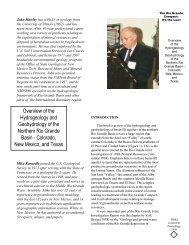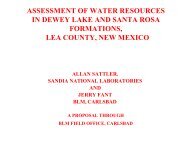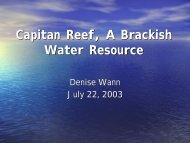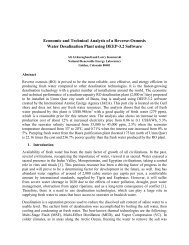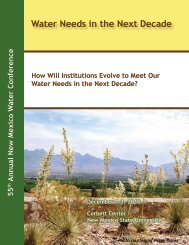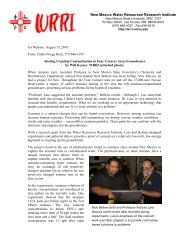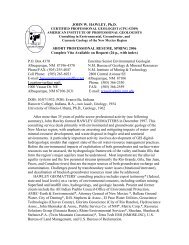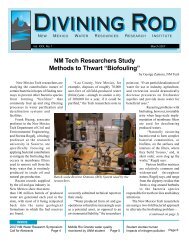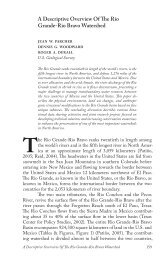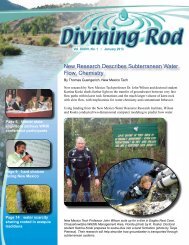Charles T. DuMars - Water Resources Research Institute
Charles T. DuMars - Water Resources Research Institute
Charles T. DuMars - Water Resources Research Institute
Create successful ePaper yourself
Turn your PDF publications into a flip-book with our unique Google optimized e-Paper software.
Prior Appropriation Law and Future <strong>Water</strong> Allocation: Preserving <strong>Water</strong> for Future Generations<br />
politics of value judgments beyond those of requiring<br />
conservation and the dissemination of information.<br />
The economist who preceded me in this lecture<br />
insists that there is a tremendous amount of disposable<br />
income in today’s society more than ever in history. If<br />
the prior appropriation doctrine is to work, though, we<br />
have to let the institutions, the users, the consumers,<br />
those people with all that money make the rational<br />
choices he talks about. He argued that an educated<br />
society buys products that promote and protect the<br />
environment, that using the least water preserves the<br />
most wetlands. I sincerely hope he is right. If we in<br />
fact have all of this disposable income out there, and if<br />
there’s the ability to buy smart water - water obtained<br />
through conservation, and if we can grow the specialty<br />
crops without excessive pollution, and if conservation<br />
can pay, and I think it can, then the people who use the<br />
resource make the choice that blends the public and<br />
private values of the resource.<br />
WATER RESOURCE AVAILABILITY, ITS<br />
VALUE IN PRODUCTION AND IN SUPPORT<br />
OF THE ENVIRONMENT MUST BE MADE<br />
COMPLETELY TRANSPARENT IN EVERY<br />
FORUM<br />
The prior appropriation doctrine is not going away.<br />
Anglos, Hispanics, Native Americans, acequias, and<br />
the conservancy and irrigation districts with their early<br />
priority water rights are not going to give up those rights.<br />
They cannot be taken because someone filed a lawsuit<br />
saying that the Rio Grande silvery minnow should get<br />
the water in times of scarcity rather than farmers.<br />
Society will not tolerate that result. The system is going<br />
to stay in place. But society will also not tolerate a life<br />
space without farms, without wetlands, and without a<br />
diverse habitat for its people and its creatures.<br />
The first thing every economist will tell you is that<br />
you need good market information. You need to know<br />
about the resource. Where can you go today to find<br />
out anything about the value of water rights in New<br />
Mexico Bill Turner knows, and he isn’t telling. There<br />
is no place to get the information about the value of<br />
the good. There is no place to go. There is no common<br />
source of information about this commodity.<br />
In contrast, there is a great deal of information on<br />
the environmental side. They are terrific, and they do<br />
a great job. While their view of the data may be skewed<br />
from some perspectives, they are there. They know<br />
the resource they want to protect; they are protecting<br />
it, and it is vital that they do so. They will tell you how<br />
much water the silvery minnow needs, what is going<br />
to happen, and the consequences of not protecting it.<br />
But on the market private sector side, from the production<br />
value of<br />
...there is a tension on the<br />
one hand, between the<br />
desire to let the economy<br />
allocate the resource by<br />
price and forcing other<br />
users to react to the scarcity<br />
by adjusting to the<br />
marketplace by conserving.<br />
And, there is the political<br />
desire to subsidize, to<br />
control the price by<br />
mandated alteration of the<br />
cropping patterns.<br />
water, there is<br />
no common<br />
place to find out<br />
the value of<br />
water in production,<br />
its<br />
overall supply<br />
and how to<br />
obtain it. This<br />
must improve<br />
for the system<br />
to function in<br />
the future.<br />
Not only is<br />
the absence of<br />
good information<br />
a serious<br />
problem for good water policy, another thing that the<br />
prior appropriation doctrine of water markets cannot<br />
stand is policy surprises. If there is to be a change in<br />
the policy about whether you can use ground water to<br />
offset water rights in certain communities and other<br />
wells, it needs to be a public process where everybody<br />
goes. If rules for conservation change, the changes<br />
must be made public through a public process. The<br />
problem is one of scale. If the prior appropriation<br />
doctrine is to work, the development of process will be<br />
vital. The system works well within a small acequia<br />
where everybody knows everybody, and you know if<br />
they are not digging out their part of the ditch or are<br />
using too much water.<br />
When you have 10,000 farmers or you have the<br />
City of Albuquerque paying a lot for San Juan-Chama<br />
water, and you have a decision made by a court that<br />
will affect investments already made, then without full<br />
public process, by the recognition of new rights in water<br />
not heretofore understood, the result can be chaos.<br />
We need to do it better than this.<br />
The third thing we need to do is we need to take a<br />
real close look at the way in which we clarify the<br />
19





